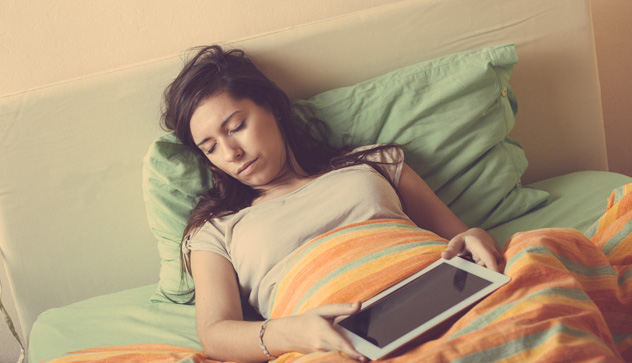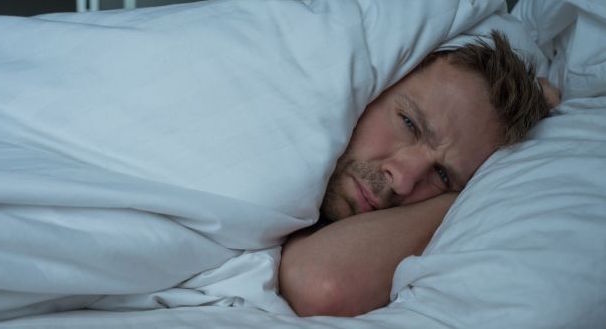Not being able to get to sleep can be a frustrating experience resulting in you tossing and turning for hours on end. There is a vast amount of information about the things you should do to get to sleep, but there’s a shortage of tips about what to avoid which is equally as important.
Whether you’re suffering from long term insomnia or you’re just trying to improve your sleep quality, there’s always room for improvement. We’ve outlined many things to avoid if you’re struggling to get to sleep and most readers will probably be surprised as to how many of these they commit on almost a nightly basis.
Browse Your Phone
If you’re struggling to get to sleep then sitting on your phone is not going to remedy this. When you start playing with your phone or tablet, this increases the alertness of your brain which improves your focus and attention making it less likely for you to feel tired.
Mobile phones should not be part of your sleeping routine especially because the screen emit blue light which can suppress the production of the sleep hormone Melatonin which then delays the feeling of tiredness. Being on your phone should be avoided no matter what task you’re doing whether it's texting, playing games or browsing other apps.

You’ll find that if you sit on your phone for some time then try to sleep you’ll find it hard to relax and your mind will still be very active usually thinking about what you were looking at. You should place your phone as far away from you as possible, so you don’t have the temptation.
Take a Sleeping Pill
Sleeping pills are becoming more and more popular and are the chosen solution for people who have a long-term problem with getting to sleep. We believe that sleeping pills should be avoided long term if at all possible because this creates the situation where over time you may be dependent on them to be able to sleep.
They can, however, be useful in selective situations as a short-term solution and if possible, they should be avoided altogether, as there are many other solutions. Also, sleeping pills are recommended to be taken earlier in the night when you first try to sleep.
If you take them in the middle of the morning after hours of tossing and turning, they can lead to you feeling groggy in the morning affecting your performance throughout the day.
Strenuous Exercise
It may seem logical to get up and do some high-intensity exercise if you can’t sleep with the reasoning being that the exercise will tire you out making it easier for you then fall asleep. Although working out in the evening or before bed doesn’t usually affect your sleep unless it’s strenuous exercise.
Excessive endurance exercise triggers a stress response by the body which leads to a rise in stress hormones which consist of adrenaline, cortisol and norepinephrine. These hormones lead to an increase in alertness, blood flow to muscles and heart rate which then makes it difficult to sleep.
There has been evidence put forward that has concluded that exercise may induce a placebo effect when it comes to falling asleep. It shows that when people exercise they think their sleep will be better leading to them sleeping better.
Your response to exercise will be individual to you; some people may struggle to sleep straight after whereas it will be a great solution to others, so it’s important to try different things to see what works for you.
Disregard Discomfort
One of the most overlooked issues is that you may be struggling to sleep because your body is in discomfort, but over time you may not realise because it’s been going on for so long.
There are some key symptoms to be aware of if you’re struggling to sleep; if in the morning you wake up with a backache then you may need a new mattress or a different type of mattress.
You need to be aware of other distractions that may be taking place, so if your room is too loud, then you may need to close your window or use a white noise machine.
If your room is too hot, then you need to lower the temperature and vice versa. The takeaway here is that you shouldn’t just settle and make do with your sleeping environment and if you have an issue you need to fix it.
Once you create the perfect sleeping environment, your body will drop off to sleep in a matter of minutes giving you the restful sleep that you deserve.
Snack
Eating a light snack before bed is recommended because it gives your body fuel to utilise while you sleep so you won’t wake up in the middle of the night hungry. However, when it comes to sleep nutrition, it’s not just about what you eat but also when you eat it.
If it’s the middle of the night and you can’t sleep, you’ll often be drawn to sugar and carbs which are easy and quick to eat, but your body will quickly convert these foods to energy which can lead to you staying more awake.
Also if you eat a dense meal, then you may struggle to sleep as your belly may feel uncomfortable especially if you’re a front sleeper.
Caffeinated products should be avoided, and you should check if any of the food you plan to eat contains stimulants as this will result in the opposite intended effect leaving you wide awake for even longer. The best types of foods include fruit, veg or high protein sources such as nuts.
Worry & Stress
It’s natural that the longer you have trouble sleeping, the more you sit and worry about not getting to sleep which then further increases your stress levels.
We’ve all been there where you’re continually looking at the clock recalculating the diminishing number of hours you have before you need to wake up. Unfortunately, the more you worry, the harder it will be to fall asleep, so you need to view your sleeping routine as achieving full relaxation then the sleep will follow.

If you need to remove the clock from your room then especially if it’s a glowing clock where you can still see the time in the dark, there are several healthy stress coping strategies which work as a remedy including simple breathing exercises and meditation. These methods reduce tension and stress which then help you to relax and sleep more effortlessly.
A research study has taken place that analysed the results of 47 trials featuring a total of 3,515 subjects which concluded that mindfulness meditation results in small to moderate improvements in stress, anxiety and depression.
Turn On Your TV
Usually when you can’t sleep, one of the first attempted solutions is to turn the TV on to try and help drift off. However, this can harm your sleep, because similar to mobile devices the blue light emitted can interfere with the release and suppression of sleep hormone Melatonin.
Even if you feel like it does help you get to sleep, it can still interfere once you fall asleep. The blue light exposure can still delay the start of REM sleep so even though you’re sleeping it can be harder to fall into a deep sleep. This can lead to you not feeling fully rested in the morning even though you think you’re getting great sleep.
The other reason to avoid having the TV on is that even if you do fall asleep, there is going to be noticeable background noise that could disturb you out of your sleep throughout the night. While you sleep your brain doesn’t completely switch off, and it’s able to continue registering external sounds. This is especially the case if you’re a light sleeper.
Don’t Just Lie There
We all know when it’s going to be one of those nights where we’re going to struggle to get to sleep, and you can usually tell quite early one. This is especially easy to know if you’re suddenly trying to get to sleep several hours than usual after sleeping on the same day.
On nights like this, you should avoid just lying there if you know you aren’t going to drift off anytime soon. The problem with this is that it signals to your brain that the bed is for lying awake in and not for sleeping which can lead to a longer-term problem of struggling to fall asleep.
If after an hour you can’t get to sleep then it’s time to reset your sleep routine and find something to do that will make you feel sleepy such as house chores or reading a book. When you begin feeling tired, then it’s time to try sleeping again.
You Don’t Always Need To Brighten the room
The intensity o your lighting will vary depending on your current situation. If you’re struggling to get to sleep, then the best solution may be to reset your sleeping routine and turn on the lights.
However, if you’ve had a light sleep and been woken up, then there’s a high chance that you can get back to sleep quickly if you maintain the same environment and keep the lighting low.
Even if you need to go to the toilet or go to make a drink, you can often do this by turning on a little light as possible to keep your body in sleep mode so that you can drop off back to sleep shortly after. It isn’t a one size fits all solution, so it depends on the current circumstances that night.
If you have a small lamp or lights that allow you to fine toggle the brightness, then this is even more appropriate to use.
